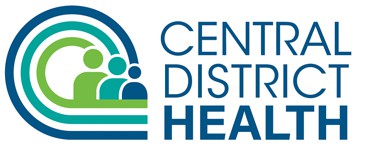BOISE, July 31, 2023 – As the summer sun blazes overhead, people of all ages enjoy time in or near a swimming pool for some splashing fun.
Central District Health conducts annual inspections of all public pools in Ada, Boise, Elmore and Valley counties, guaranteeing that all our community members enjoy a safe swimming environment.
Private pools in Idaho, such as those in hotels, HOAs or private gyms, are not regulated and are not required to pass the annual sanitary inspection conducted by the health districts, but are, nevertheless, expected by users to maintain a clean and safe environment through on-going testing and maintenance.
“Regular water testing is a fundamental aspect of maintaining a safe swimming environment,” explained Amanda Church, CDH Environmental Health Specialist. “By maintaining clean facilities and monitoring the chemical balance and bacteria levels in the pool water, pool owners and managers can proactively prevent potential health hazards,” she said. “Water testing allows us to ensure proper disinfection, maintain pH balance and protect swimmers from harmful bacteria.”
Church highlighted the top five guidelines that swimmers and pool maintenance teams should make sure to take into account.
“Remember, prevention starts with knowledge, and regular water testing provides the main information needed to keep our pools safe and healthy,” she said.
Healthy Hygiene Practices
Promoting healthy hygiene practices is a shared responsibility to protect yourself and others. Encouraging swimmers to shower before entering the pool reduces the introduction of oils, sweat and personal care products that can interact with pool chemicals. Church recommends applying sunscreen at home prior to donning your bathing suit so you don’t miss any areas. After applying sunscreen, wait 30 minutes to enter the water to allow it to soak in.
Prevent Illness
Stay out of the water if you are sick and/or have diarrhea. Take kids on bathroom breaks and check diapers regularly. Change diapers away from the water and make sure to wash your hands afterwards to help keep germs out of the water.
Regular Water Testing
Church emphasized that water testing is the cornerstone of pool safety. Regularly checking the pool’s chemical composition ensures that disinfectants like chlorine are at optimal levels to combat bacteria, viruses and other harmful pathogens. At least once per day in minimally used pools and more often as needed with higher use. Testing pH levels also helps avoid skin and eye irritation, ensuring the water remains comfortable and safe for swimmers.
Keeping it Clean
Maintaining a clean pool goes hand in hand with safety. Church said that a well-functioning filtration system, along with proper circulation and scheduled clean ups, help remove debris and prevents the buildup of harmful bacteria, algae and other contaminants.
Professional Maintenance
Seeking professional maintenance services ensures proper water chemistry and hygiene. Church encourages pool owners to invest in expert care, ensuring their pool remains safe and fun.
Church said all pool maintenance staff should take the course to become a Certified Pool Operator (CPO). In addition, businesses and pool owners are encouraged to maintain their aquatic facilities in accordance with the CDC’s Model Aquatic Health Code.
“I want to keep our children safe in the summer by ensuring that all our area pools, regulated or not, are properly maintained by their respective operators,” Church said. “Keeping up on routine maintenance and with the help of the community we all can be informed of any issues, assuring families their visit to the local pool is safe.”
If there are reports of ongoing health risks at any pool facility in District IV, whether public or private, CDH staff will conduct an investigation to determine the risk and recommend mitigation strategies the owners can take to remove bacteria and prevent illnesses. The role of CDH Environmental Health Services is to inspect regulated swimming pools and to provide technical assistance to prevent the spread of communicable disease and injuries.
More information and resources about healthy swimming can be found online at the Centers for Disease Control and Prevention.
About Central District Health
CDH, Public Health District IV, is one of seven public health districts within the state of Idaho, serving the counties of Ada, Boise, Elmore, and Valley. With a vision of Healthy People in Healthy Communities, CDH’s emphasis is on decreasing risk factors for chronic disease, improving quality of life and increasing the years of healthy life among residents.
Contact: Maria Ortega, Communications Manager
Office: 208-327-8639 | Cell 208-871-1712
mortega@cdh.idaho.gov | cdh.idaho.gov/news
Follow @cdhidaho (FB, Twitter & Instagram)
###

